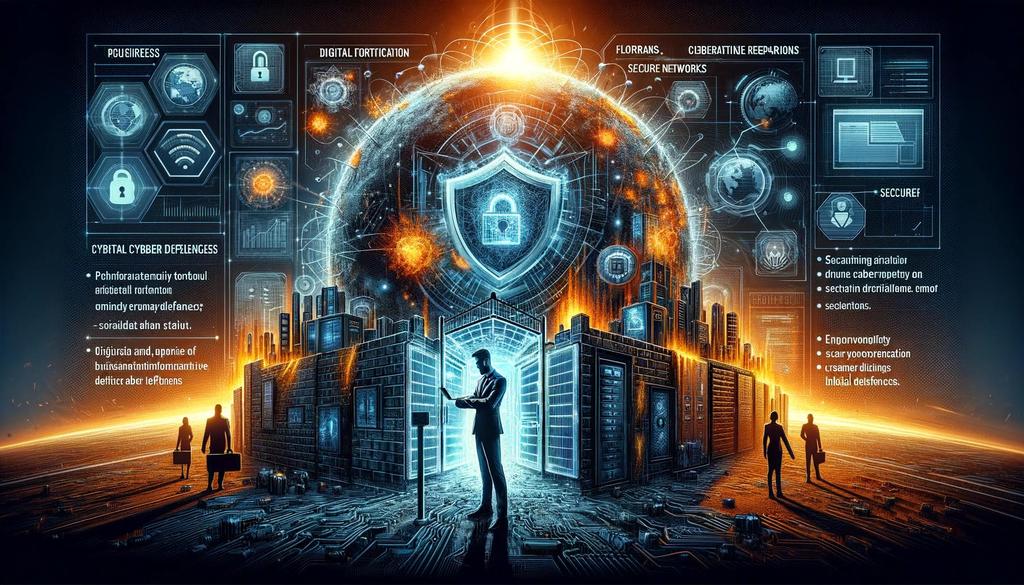In an increasingly digital world, businesses are rapidly becoming a prime location for cybercriminals. The cat-and-mouse game between corporations and modern-day thieves intensifies with each advancement in technology. As entrepreneurs and business leaders, it is our responsibility to adapt to strengthen our digital empires against the ever-present cyber threats. From phishing scams to ransomware attacks, this challenge is real and always will be. In this article, we explore the labyrinth of cybersecurity challenges and explore how businesses can better prepare.
Understanding the risk situation
To combat cyber threats, businesses must first understand the complexity of the digital risk environment. These risks are not just about data breaches. They threaten the very integrity of a company's operations. Cyberattacks can undermine customer confidence, distort financial stability, and destroy the market advantage that companies work so hard to achieve.
Cultivate a culture of security awareness
The foundation of a robust cybersecurity strategy is your organization's culture. From the CEO to the newest intern, everyone needs to be aware of and participate in our collective cyber well-being. Creating a culture of security awareness starts with regular training programs, not only of a technical nature, but also related to the roles and responsibilities of each employee.
Regular updates and workshops can help employees recognize and respond to phishing attempts, understand the importance of strong passwords, and recognize the importance of protecting sensitive information. Humanizing cybersecurity makes it relevant to each person and makes it a personal priority above corporate goals.
Technology as the first line of defense
Advanced technology plays a central role in protecting enterprise networks and data. Firewalls, antivirus software, and intrusion detection systems act as guardians of your digital wall. Additionally, encrypted communications and secure cloud storage options equate to cyber resilience for your business.
Automation also brings new perspectives to cyber defense. AI-driven security solutions can quickly analyze patterns and prevent potential threats before a breach occurs. However, technology alone is not enough. Human insight is required to make strategic adjustments and respond to the nuances of an ever-evolving digital threat panorama.
Regular risk assessments and response plans
No business is impossible. Regular risk assessments reveal potential vulnerabilities in systems and procedures and provide a roadmap for hardening. These assessments should not be stylized presentations, but rather dynamic, actionable analyzes that evolve as business practices and technology change.
An essential part of understanding potential exposure is having a solid incident response plan. This plan shouldn't just be a document gathering dust on a shelf. It is a living blueprint practiced and perfected through regular cyber training, and requires all aspects of the organization to participate in a consistent and decisive response to incidents.
Investing in cyber insurance
No matter how well a company prepares and protects itself, the potential for a security breach remains. Cyber insurance has emerged as a safety net to reduce financial losses, cover recovery costs, and provide access to expert assistance during and after a cyber incident. This is proof of concept that when it comes to cybersecurity, it's just as important to be proactive as it is reactive.
The human element of cybersecurity
While technology and protocols are the backbone of any cybersecurity program, weaving the human element into the fabric of cyber protection is what brings the program to life. Employees who feel personally responsible for the safety of their digital workspaces are your strongest defense. It's about fostering a sense of personal investment, where every individual feels like an essential link in the security chain.
The supportive touch provided to employees as they navigate this area is critical. An open-door policy for reporting anomalies, employee recognition for proactive security practices, and individualized guidance when mistakes occur all contribute to a harmonious security culture.
Partnering with cybersecurity experts
Cybersecurity challenges may require expertise beyond your in-house capabilities. This is where partnering with cybersecurity experts becomes important. These experts, like trusted advisors, can provide new insights, adjust security approaches, and introduce proactive measures that complement a company's internal efforts.
In some cases, when working with sensitive data or conducting important research online, you may need to use certain solutions and services that maintain your anonymity and secure connection. In such cases, businesses may resort to certain tools such as his GoProxies, which help maintain privacy and security in sensitive operations.
Regulatory Compliance and Cybersecurity Law
Cybersecurity is more than just a preference. In many cases it is a legal requirement. Governments around the world are introducing stricter regulations to protect consumer data. Complying with these laws not only avoids penalties, but also increases your company's credibility and security awareness. Staying on top of cybersecurity laws is an ongoing process that should be a key element in any strategic plan.
Continuous improvement of cybersecurity
Finally, it is essential to understand that cybersecurity is not a destination, but a journey of continuous improvement. As technology upgrades and new threats emerge, existing security measures must be evaluated and strengthened. In the fast-paced realm of cyber information, complacency can quickly lead to vulnerabilities. Therefore, the ideas of sustainable development and adaptability are of paramount importance.
Cybersecurity issues require attention
Preparing your business for cybersecurity challenges is no easy task. It requires a complex combination of education, technology, planning, insurance, compliance, and constant vigilance. These components work together with a human touch to create a powerful defense against the myriad threats that lurk in the digital shadows.
As leaders, we must recognize that cybersecurity is not just an IT issue, but a holistic business objective that is directly related to long-term success and survival. By taking concerted steps to educate, protect, and adapt, we not only develop a strategy but also build a corporate spirit that is resilient in the face of cyber adversity.


